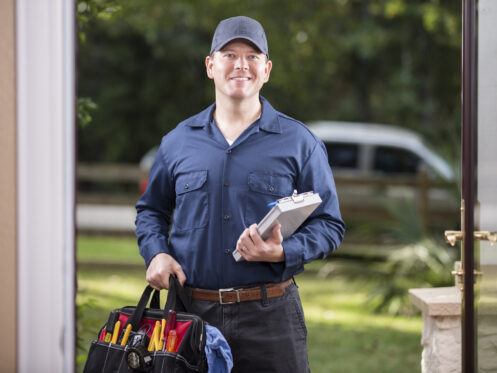A well-maintained air conditioner plays an important role in the indoor comfort of your home. Regular maintenance helps your AC unit live up to its expected lifespan and perform to the best of its ability. While many homeowners recognize the significance of AC maintenance, some also feel unsure about how frequently to schedule the sessions. Failing to implement required AC maintenance can result in an uncomfortable home and could lead to the premature breakdown of the appliance. A look at how often you should service your air conditioner can guide you in maintaining the HVAC units in your home.
When Should You Service Your Air Conditioner?
Experts recommend scheduling a professional AC tune-up on an annual basis. This tune-up usually includes a thorough inspection, a review of refrigerant levels, filter and coil cleaning, and an evaluation of the overall performance of the unit. A complete system tune-up may also include a review of all electrical connections, capacitor testing, and an evaluation or adjustment of the blower motor and other physical components, like the blower fan. After completing the tune-up, many HVAC companies provide a written summary of the inspections and tests conducted along with the results and recommendations for the future. If any damage or malfunction is severe, the HVAC technician might be able to complete repairs on the spot.
Experts also recommend scheduling seasonal AC checkups twice each year. A pre-season maintenance session should occur in the spring with a second postseason session in the fall. This allows HVAC technicians to identify any problems before the extreme heat of the summer or the bitter cold of the winter. Your AC unit is likely to work overtime during the summer, and the last thing you need is for your air conditioner to break down during a blistering heatwave. Likewise, conducting maintenance in the fall allows the HVAC technicians to fix any major wear and tear that occurred during the summer. In this way, the technician can mitigate serious problems before your unit goes dormant for the winter.
What Are Other Factors That Influence Air Conditioner Maintenance?
While annual tune-ups and seasonal checkups are standard recommendations, other factors can influence the need for additional AC maintenance. These factors include climate and frequency of usage. If you live in a hot and humid climate, your air conditioner will operate for longer periods to keep your house cool. This increased usage can strain the unit and necessitate frequent maintenance. An HVAC technician can ensure that your air conditioner can rise to the climate demands of your location. Similarly, you also need to remain mindful of any local issues like increased dust, pollen, pollution, or other allergens and contaminants. These factors can hinder the optimal performance of your air conditioner, and the uncorrected accumulation of particles like dust or pollen can lead to unexpected breakdowns.
Other factors to consider include air conditioner age and unit type. Older AC units may require additional servicing to compensate for wear and tear. Different types of air conditioners like mini-splits, window units, or central AC systems can all have different maintenance needs. Even the manufacturer guidelines for different models may vary, and adherence to such guidelines is important for warranty compliance. If you have any doubts or concerns about your unit, work with an HVAC technician to design a custom maintenance schedule tailored to your unique situation.
Signs You Need Air Conditioner Maintenance
Regular AC maintenance is essential for the longevity and best performance of your unit. However, there are unique circumstances that may signify that your AC needs immediate attention or servicing. Learning to recognize the signs can guide in scheduling maintenance before air conditioning problems spiral out of control.
Blowing Warm Air
The purpose of an air conditioner is to create a cool and comfortable environment within your house. Warm air from your AC vents can represent one of the first signs of a problem. This can indicate that the unit is leaking refrigerant or that the compressor has stopped working properly. An HVAC technician can diagnose the issue and provide troubleshooting to restore the unit to good working order.
Weak Airflow
Poor airflow is often an indication that the air conditioner has a faulty compressor or some type of obstruction or blockage. Even if the temperature of the air is cold, a sharp decline in airflow means that an HVAC technician needs to check for defects within the system.
Strange Noises
AC units make occasional noises like a low humming sound or system reset. This is expected. However, loud noises like grinding, rattling, or squealing can signify mechanical defects or worn-out components. An HVAC expert can pinpoint the source of the sounds and complete repairs as needed.
Unpleasant Odors
Foul odors can signify the growth of mold, mildew, algae, or bacterial microbes. These contaminants can compromise indoor air quality and pose a health hazard. The growth of mold and mildew may also indicate excessive moisture within the system. This can cause additional smoke or burning that creates a safety hazard.
Inconsistent Home Temperatures
Hot spots or temperature fluctuations in rooms throughout the home can indicate airflow problems or thermostat defects. If you notice inconsistent temperatures, a professional can locate the underlying cause and stabilize conditions within your house.
Short Cycling
A malfunctioning air conditioner may turn on and off frequently to maintain consistent indoor temperatures. This constant reset process is known as short cycling, which indicates that the system restarts before completing a full standard cooling cycle. Short cycling can create undue wear and tear, and the increased energy consumption can cause your utility bill to go up. Regular maintenance may reduce the likelihood of short cycling.
Higher Energy Bills
Poorly maintained air conditioners may draw more power from the grid than usual. If you notice a spike in your energy expenses, it may indicate that your system needs professional intervention. Problems like broken components clogged coils, and undetected leaks can all cause the unit to consume more energy to complete the cooling cycle. You might find yourself setting the temperature as low as possible to cool your home more effectively, and your utility bill will suffer as a result. Consistent servicing can help boost energy efficiency and lower these high costs.
What Does Air Conditioner Maintenance Include?
According to the U.S. Department of Energy, routine maintenance is required for your air conditioner to operate effectively and efficiently over the lifetime of its service. Standard maintenance includes inspection of the AC filters, coils, and condensate drain. Maintenance may also include inspection of the moving parts, thermostat, and outdoor unit.
Clean or Change Air Filters
Dirty or clogged air filters can obstruct airflow and reduce the unit’s efficiency. In addition, the accumulation of dirt can also cause pollutants to circulate throughout the home. Replacing the air filter can reduce the risk of dirt, debris, and other contaminants from clogging the system. According to the Department of Energy, replacing your filter can reduce your air conditioner’s energy consumption by 5% to 15%.
Inspect and Clean Evaporator Coils
Dirt and grime can accumulate on evaporator coils over time. This grime can restrict airflow and insulate the coil, compromising the ability to complete the cooling system. During maintenance, an HVAC technician can inspect the condition of the coils to improve the efficiency of your unit.
Check and Clean the Condensate Drain
The condensate pan collects condensation from the air conditioning unit. This moisture in the tray then travels through a drain line that leads to the exterior of your house. Leaks in the drain line can cause moisture damage to your property and reduce the efficiency of your unit.
Calibrate the Thermostat
The thermostat helps your AC unit regulate temperatures within the home. During maintenance, an HVAC technician can test the accuracy of the thermostat and calibrate the device if necessary. The technician can also replace or upgrade the thermostat to prevent inconsistent temperatures or high energy consumption.
Inspect the Blower Motor and Fan
HVAC experts can inspect and test the blower motor to reduce the chances of malfunction or unexpected breakdowns. A technician can also check the blower fan for signs of wear and tear. Properly functioning fans improve air circulation and airflow.
Inspect and Lubricate Moving Parts
Excess friction can wear down parts faster than normal and result in premature replacements. An important part of maintenance is the lubrication of any moving parts to ensure smooth operation and function.
Contact Us Today
Knowing the best times for AC maintenance helps guarantee your unit is ready exactly when you need it. Bobby L Greene Plumbing, Heating & Cooling Co. provides air conditioner maintenance service for homes in Shreveport, Bossier City, and surrounding areas. We offer annual AC tune-ups as well as seasonal maintenance checkups. Our technicians also install brand-new units and provide fast repairs in the event of emergencies. No matter the HVAC issue, we can help. Contact Bobby L Greene Plumbing, Heating & Cooling Co. for all your cooling needs.

